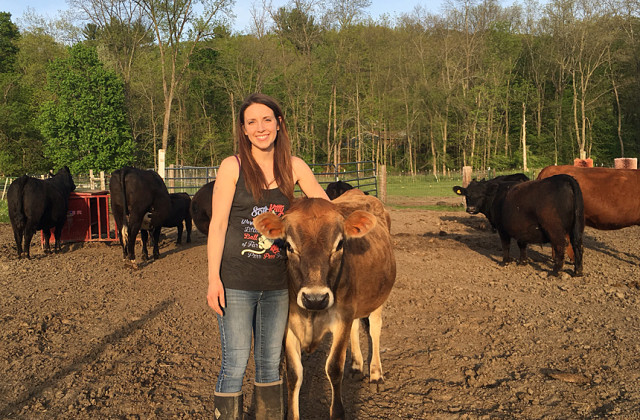The Challenges and Joys of Owning a Small Farm
Not for the Faint of Heart
By Ruth Melville
People like the idea of local farms. They enjoy seeing cows grazing in a field or the piles of fresh vegetables on the table at the farmers market. But they are less likely to appreciate the amount of work that goes into starting a small family farm. Lost Ruby Farm, Husky Meadows Farm and Howling Flats Farm are all small and relatively new farms in the area, and a comparison of their experiences finds similar concerns and rewards.
Adair Mali and Antonio Guindon run Lost Ruby Farm on 14.5 acres in South Norfolk, where they raise goats and chickens, pigs and turkeys. Their specialty is the fresh and aged cheeses they make from their goats’ milk.
It took two years of inspections and permits before they got the farm up and running. The couple admits that they made some mistakes getting started, thanks in part to conflicting advice from different regulatory groups—the town zoning commission, the building inspector, the Torrington Area Health District, the Connecticut Department of Agriculture and the Department of Energy and Environmental Protection.
The long process was a drain on their patience and resources. Mali admits there were times she was tempted to quit, but Guindon grew up in Costa Rica, where he says the regulations and red tape were “10 times worse,” and he encouraged her to keep going.
Mali, Guidon, and Guidon’s oldest daughter, Oriana, share the work on the farm. They have a tag-team system for doing the milking. Each goat has a name, not just a number, and the family keeps track of milking on a board posted on the barn wall. Mali is also ServSave certified in food handling.
With 10 goats, Lost Ruby Farm is classified as a “microdairy.” With a limited amount of land, it would be hard to expand, and a larger herd would mean stricter regulation. Mali is comfortable with their size. “Being really small allows for really tight control.”
Husky Meadows’s Joe Hurst knows that starting out in farming can be rough. He points out that many small business owners, not just farmers, need to make money right away and don’t have the resources to keep pushing through barriers for three or five years until they’re successful.
Husky Meadows specializes in what Hurst calls “value-added” produce, like fennel, kohlrabi, and nine varieties of radishes. They also have a licensed baker, Steve Archaski, who is responsible for the farm’s popular polenta cake, made from corn grown on the farm. They would like to sell pickled vegetables and relishes, but acidified products would require a special license.
Husky Meadows made the decision to become a state-certified organic farm. It’s a “challenge” to become certified, Hurst says, “and a lot of farms don’t do it.” For one thing, it’s “intense in the record-keeping department.” Everything used on the farm—compost, manure, seeds—must be documented and shown to be organically raised or produced. “It’s hard for a farmer to survive and be certified organically,” he acknowledges.
Kelley Babbin bought Howling Flats Farm, 15 acres in North Canaan, in August 2010 with her son, John Mochak. The farm has 35 head of cattle, over 20 hogs, 10 goats and more poultry than Babbin can count. Babbin, Mochak, and his girlfriend Becky DiQuattro do all the work on the farm.
Babbin laughs when asked whether it was hard to get Howling Flats Farm up and running. “I’d be lying if I said it was easy. This has definitely been a labor of love for all of us.” She stresses that “raising livestock is not something you can do half-heartedly.”
Like the farmers at Lost Ruby, the Howling Flats team is very hands on with the animals. Babbin is proud that “we work hard every day giving our animals the best food and the best life for the time they are with us.” But this is labor intensive and time consuming, and it’s all the more difficult because the three of them also work full-time jobs off the farm.
The biggest hurdle Howling Flats has faced is access to processors. All the farm’s meat is processed at USDA-certified humane abattoirs in New York State. There are no approved custom meat processors in the Northwest Corner, and there are no USDA-approved poultry processors in the entire state of Connecticut. The Howling Flats has to take its birds to Vermont or Rhode Island, which adds to its costs.
Farmers at all three farms emphasize the sheer amount of effort required to run a small farm. Mali notes, “We have to compete with big farms without the resources. A really small farm is a struggle every day.” Hurst agrees: “Our challenges and those of all local farms are many and not for the faint of heart. Garden crops are like animals, they all have to be taken care of. When the pears are ready, they have to be picked.”
But all are equally emphatic about the joys and satisfactions of farm work. “It never ceases to amaze me how peaceful and quiet our farm is,” Babbin says. “Although our animals are destined to be processed at some point, in the meantime they run, play, interact and are truly a joy to watch.” Mali says succinctly, “We do it because we really like it.”
And they all mention how fortunate they are to be farming in this area. “We are humbled by the support of our local community,” Babbin says. “We obviously could not exist without it.” Mali adds that “small farms really need support. If you like having small farms in your area, you need to put your money where your mouth is. Eat your view!”
Photo by John Mochak.

